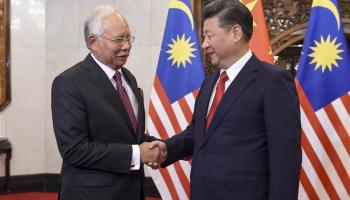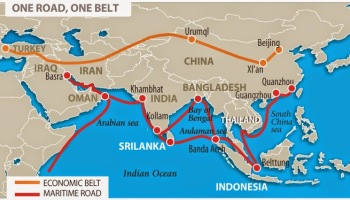Malaysia still suffers from corporate scandal after another, says Musa
 PETALING JAYA: Malaysia is great at formulating legislation for corporate governance but lacks the ability to implement and enforce these, said former deputy prime minister Tun Musa Hitam (pic).
PETALING JAYA: Malaysia is great at formulating legislation for corporate governance but lacks the ability to implement and enforce these, said former deputy prime minister Tun Musa Hitam (pic). “As far as I can remember, Malaysia is the leading developing country that currently occupies the top half of the list in formulating legislation, rules and regulations for corporate governance.
“But when it comes to implementation and enforcement, we occupy the lower half of the list,” said Musa, who is also World Islamic Economic Forum chairman. Delivering his keynote address at the Women’s Institute of Management’s Conference on Integrity and Corporate Governance, Musa said that in the past, government and corporate leaders were required to attend a course on corporate governance.
“It is quite obvious that these efforts are to no avail and the programme seems to have been scrapped.
“After all our training, Malaysia still suffers one corporate scandal after another,” he said.
The country’s weakness in corporate governance lay in its inability to enforce the rules and was the major cause of its many scandals, he said.
Musa said that good governance extended to areas relating to corruption, abuse of power, accountability, application of corporate social responsibility (CSR), transparency and protecting shareholder interest.
“If you ensure transparency and accountability in decision making, apply CSR and care about shareholder interest, then you are practising good corporate governance,” he said.
Good corporate governance, Musa pointed out, could only happen if all the laws were implemented without fear or favour.
“This is most crucial for good corporate governance and it is up to the chairman and board of directors to administer this,” added Musa.
Another important ingredient was leadership with integrity, he said.
“Leadership by example produces good governance and in my experience, if this is practised, even the most influential person can be persuaded to act in the broader interest of the corporation and shareholders.” By Jo Timbuong The Star
Corporate governance – a shared responsibility
TUN Musa Hitam was spot on when he said at a conference on Monday that a company’s directors and managers were practising good corporate governance when they ensured transparency and accountability in decision making, applied corporate social responsibility, and cared about the shareholders’ interests.
These are indeed essential ingredients if we want our companies to be run well.
And Musa was right in pointing out that good corporate governance could only happen if the laws were implemented without fear or favour.
This matters because corporate governance thrives in an environment in which the rules are clear and robust, and the regulators are firm and consistent.
However, corporate governance is not just about complying with the letter of the law. It is also about directing and controlling a company through practices, structures and processes.
Many of these elements are voluntary; a thin line separates government oversight and the straightjacketing of business with an overkill of statutory prescriptions.
For example, most experts on corporate governance agree that the roles of chief executive officer and chairman of the board ought to be separated so as to avoid concentrating a lot of decision-making power in one person.
And yet, it is perfectly legal in Malaysia for an individual to wear these two hats at the same time. It is the same in some developed countries.
It remains a hot topic, but it is clear that most regulators continue to be reluctant to outlaw this practice of combining CEO and chairman duties.
The biggest challenge is to persuade company stewards to embrace the principles of corporate governance without being prodded by the authorities and their volumes of laws.
For this to happen, the directors and managers have to be convinced that good corporate governance adds significant value to their companies.
There are many studies that have concluded exactly that, but these findings mean little if there is still the perception that most people do not care about corporate governance.
Let us look at the listed companies, whose value is measured constantly in the stock exchange as investors buy and sell the companies’ shares.
On paper, a company with a poor track record in corporate governance would have trouble getting attention in the stock market.
And yet, we have frequently seen such companies at the centre of feeding frenzies sparked by speculation that the share prices will soar for whatever reason. This is not a great advertisement for corporate governance.
Nor is it encouraging that shareholder activism in Malaysia is limp. Many of those who own small amounts of shares in a company are often indifferent to how the company is performing, preferring instead to focus on the share price.
And when they do turn up at the shareholder meetings, it is seldom to engage with the board and management and to ask tough business questions.
The regulators and company stewards alone cannot push the corporate governance agenda.
Investors and other stakeholders too must show that they appreciate the fruits of good corporate governance, instead of complaining bitterly only after companies have collapsed and huge investments have gone down the drain. The Star Says
A-G: GLCs should adopt best practices
Praise and encouragement: Ambrin speaking during the WIM Conference on Integrity and Governance at the One World Hotel in Petaling Jaya.
“In theory, the country’s best practices could be easily adopted wholly or in part by most GLCs. But in reality this is not always the case as you can see from our audit findings with regard to the business performance and corporate governance of these GLCs.
“If guidelines are not being adhered to or given exemptions, it may severely compromise the governance and expose the companies to risk of fraud and corruption,” he said in a keynote address at the Women’s Institute of Management (WIM) conference on integrity and governance yesterday.
The 2015 Auditor-General Report (Series 2) was released two days ago, in which issues like poor management of the Cooking Oil Stabilisation Scheme and weaknesses in the management of medicinal supplies at health clinics nationwide were highlighted.
On the issue of GLCs that were not doing well, Ambrin said these companies were supposed to contribute to wealth creation for the government and act as a trustee to the public.
“Instead, they might become a burden, asking for bailouts and additional grants or to convert their loans to equity so they can continue to exist as a going concern, but to whose benefit really, one might ask,” he said.
The Auditor-General also observed that based on his audit experience, there were times where a GLC’s board of directors had been conveniently bypassed on major decisions.
He added that companies should have at least some, if not all, the best practices required to ensure integrity and good governance in their organisation.
“For example, I am very impressed with Khazanah, they have a high standard of governance and are very professional, so to me they are a model GLC.
“Of course we don’t expect smaller companies to have the full-scale best practices that they have, but at least have some elements like a standard operating procedure, internal audit committee, and a good board of directors,” he said.
Former Law Minister Datuk Zaid Ibrahim said merely having policies for integrity and good governance in place were not enough.
“Malaysians need to talk about it and live it in order to move a step ahead,” said Zaid who was a panellist at the conference.
He said putting integrity into action may be challenging because of restrictive laws like the Official Secrets Act but that shouldn’t stop people from doing so.
Zaid said if Malaysians were committed to the principles of integrity and good governance, they needed to be courageous in their cause.
“You cannot defend integrity without courage but be prepared to pay a price for it. You might not get promoted, or get the title, or the contract you want but integrity needs to be cultivated, no matter the price,” he said.
Zaid also said the courage to fight for integrity must come from within and individuals cannot expect the higher-ups to lead the way.
“You must own it and start with yourself,” he said, adding that the more people embrace the idea of integrity, the higher the chance of creating a society driven by morals and truth.
- By LOSHANA K SHAGAR and JO TIMBUONG The Star
Related:
1MDB global embezzlement and money-laundering scandal – more ...
Related posts:
Mar 10, 2016 ... KUALA LUMPUR: Malaysia's ranking dropped four places in the Corruption
Perceptions Index (CPI) last year. The index, released by ...
MINISTER in the Prime Minister’s Department Datuk Paul Low recently
told the Dewan Rakyat that the Malaysian Anti-Corruption Commission...
Oct 15, 2016 ... Sabah's watergate scandal unfolds, engineers nabbed, civil service back in
vogue .... Civil service back in vogue - for the wrong reasons.

https://youtu.be/01stOYgM9x0 It was a record haul by the Malaysian Anti-Corruption Commission – RM114mil seized from two top officer...
Jabatan Air Negeri Sabah - http://malaysianlogo.blogspot.my/2014/06/jabatan-air-negeri-sabah-sabah.html KOTA KINABALU: Everywhere in Sab...


Jabatan Air Negeri - Customer Service How the millions were
stolen? 1. Contracts broken down to small packages of RM100,000 ea...










 Movers and shakers: Dr Wee (centre) flanked by former Taiwan President Ma Ying-jeou (Wee’s right) and WCES founder and patron and Country Heights Group of Companies founder Tan Sri Lee Kim Yew cutting ribbons at the opening ceremony of the 8th WCES in Malacca. Also joining them are (from left) WCES co-chairmain Datuk Seri David Yeat, Asli CEO Tan Sri Michael Yeoh, Asli and Sunway Group chairman Tan Sri Jeffrey Cheah, Plantation Industries and Commodities Minister Datuk Seri Mah Siew Keong, former Indonesian President Susilo Bambang Yudhoyono, Malacca Chief Minister Datuk Seri Idris Haron, former Australian Prime Minister Kevin Rudd, former Pakistani Prime Minister Shaukat Aziz, former Thai Deputy Prime Minister Dr Surakiart Sathirathai, Quest International University Perak chief operating officer Nicholas Goh, Mah Sing Group marketing and innovation general manager Lily Lee and Star Media Group Bhd editor-in-chief Datuk Leanne Goh.
Movers and shakers: Dr Wee (centre) flanked by former Taiwan President Ma Ying-jeou (Wee’s right) and WCES founder and patron and Country Heights Group of Companies founder Tan Sri Lee Kim Yew cutting ribbons at the opening ceremony of the 8th WCES in Malacca. Also joining them are (from left) WCES co-chairmain Datuk Seri David Yeat, Asli CEO Tan Sri Michael Yeoh, Asli and Sunway Group chairman Tan Sri Jeffrey Cheah, Plantation Industries and Commodities Minister Datuk Seri Mah Siew Keong, former Indonesian President Susilo Bambang Yudhoyono, Malacca Chief Minister Datuk Seri Idris Haron, former Australian Prime Minister Kevin Rudd, former Pakistani Prime Minister Shaukat Aziz, former Thai Deputy Prime Minister Dr Surakiart Sathirathai, Quest International University Perak chief operating officer Nicholas Goh, Mah Sing Group marketing and innovation general manager Lily Lee and Star Media Group Bhd editor-in-chief Datuk Leanne Goh.







 That is what is sorely needed to improve MCA’s chances of winning back the Chinese vote in the next general election, which is Najib’s ultimate challenge to the party.
That is what is sorely needed to improve MCA’s chances of winning back the Chinese vote in the next general election, which is Najib’s ultimate challenge to the party.




